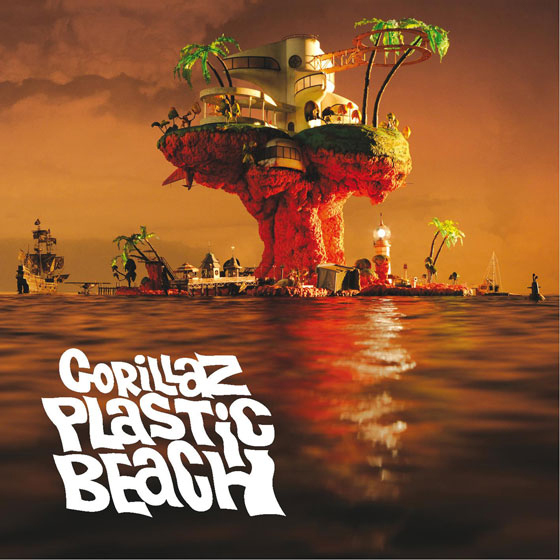In the fickle arena of pop, the dilettante is King. Small wonder, then, that Damon Albarn has left such an indelible imprint on the musical landscape over the past decade and a half: Blur’s evolution from slacker chancers to mod-pop pin-ups and finally navel-gazing art rockers earning them a reputation for staying one step ahead of the game. Not that this chameleonic trait has met with universal acclaim: for the po-faced muso purist, it’s synonymous with inauthenticity, phoniness and cynical opportunism.
Even his fiercest detractors, however, could never accuse Albarn of shirking from a challenge. Fresh from the musical equivalent of "bringing the old gang back together for one last case" which was last summer’s Blur reunion gigs, he’s resurrected his cartoon protagonists for arguably his most audacious project to date. Certainly the third Gorillaz album is a tough sell: a virtual band with a fictional backstory peddling a concept album about environmentalism was never simply going to be an exercise in box-ticking populism. Yet in a perverse way it represents Albarn at his most creatively honest: always a musician who seemed happiest when working with collaborators, he’s eschewed the worthy but dull solo route of Britpop contemporaries Jarvis Cocker and Brett Anderson to create something infinitely more interesting, while deflecting potential accusations of pomposity by creating a two-dimensional alter-ego from which to hide behind. Which is not to say his over-sized personality is not stamped all over Plastic Beach, a record of vaulting ambition and disorientating eclecticism punctuated with moments of maddening pop brilliance. It’s the first self-produced Gorillaz record, and while on first listen it appears to miss the sonic cohesion and studio nous which Danger Mouse brought to the table on predecessor Demon Days, the restless genre-shifting and boundless invention on display provides a chaotic charm which compensates for the album’s occasional lack of coherence.
The first four tracks alone are indicative of this record’s breathtaking scope: after the lushly symphonic orchestral intro, Snoop Dogg rocks up to welcome us to the world of the plastic beach, his inimitable snarl delivering what feels like an Orwellian public service announcement as he reveals: "the revolution will be televised". The surrealness quota is raised a notch further still with ‘White Flag’, an unlikely but inspired fusion of UK grime, Arabic and oriental music, and surely the only occasion which MCs Kano and Bashy are likely to share a billing with the National Orchestra For Arabic Music. ‘Rhinestone Eyes’ is a quintessential Gorillaz track in the ‘Clint Eastwood’ mould, Albarn monotoning cryptically about "rain falling like rhinestones from the sky" over an analogue synth riff, with MIA-esque chanting in the background.
The artistic credits may at times read like a roll call of washed-up old has-beens, but Albarn demonstrates an uncanny knack of restoring faded artists to their former glories. De La Soul reprise their daisy age vaudeville act for ‘Superfast Jellyfish’, enlisting the help of Super Furries frontman Gruff Rhys to contribute the gloriously unhinged jingle-cum-chorus. Lou Reed probably hasn’t sounded as louche and vital as he does on the proto boogie-funk of ‘Some Kind of Nature’ in decades. Bobby Womack’s utterly transcendent vocal turn on ‘Stylo’ lifts a hitherto subdued single to the status of pulsating Moroder-inspired classic; he repeats the trick on ‘Cloud of Unknowing’, an otherworldly soul ballad of epic proportions; Mark E Smith’s contribution on ‘Glitter Freeze’ may disappoint fans hoping for a heroic pop reinvention of a Mancunian icon in the style of ‘DARE’, his belligerent "where’s north from ‘ere?" opening gambit ushering in the album’s most avant-garde cut, which builds stealthily into a full-on discordant electro-noise assault. Of the guesting MCs, Mos Def takes the spoils for his imperious flow on ‘Sweepstakes’, a cacophonous slice of guerrilla hip-hop lent a menacing edge by the staccato rhythms of the Hypnotic Brass Ensemble.
For all the iconic cameos, however, it’s the Albarn (or 2D, if you must) vocals which linger longest in the memory. An air of detached melancholy hangs over his stand-out collaborations with little-known Gothenburg electronic outfit Little Dragon: ‘Empire Ants’ begins as a mournful synth-lament before segueing into a woozy Balearic wig-out. ‘To Binge’ is a languidly exotic duet, with Albarn camply crooning "my heart is in economy due to this autonomy" to a wistful show tune melody. ‘On Melancholy Hill’, meanwhile, is maybe one of the sweetest melodies he’s ever composed, a sublimely dreamy electro-ballad which recalls ‘Yuko & Hiro’ from Blur’s much-maligned The Great Escape.
Quite what the record-buying public will make of Plastic Beach is anyone’s guess. Its flaws (over-long, stylistically jarring) are as much to do with the concept itself as the execution: it’s no coincidence that this sounds more like a soundtrack to an imaginary film then a studio record. For all of this, though, it’s a fascinating and frequently wonderful album of real depth and vision, packed with more ideas, tunes and imagination than anything else you’re likely to hear in 2010: a clarion call to the rest of the pop fraternity to raise their collective game.



